- Home
- Virginia Woolf
Woolf Short Stories Page 7
Woolf Short Stories Read online
Page 7
IN THE ORCHARD
Miranda slept in the orchard, lying in a long chair beneath the apple tree. Her book had fallen into the grass, and her finger still seemed to point at the sentence 'Ce pays est vraiment un des coins du monde oui le rire des filles elate le mieux . . .' as if she had fallen asleep just there. The opals on her finger flushed green, flushed rosy, and again flushed orange as the sun, oozing through the apple-trees, filled them. Then, when the breeze blew, her purple dress rippled like a flower attached to a stalk; the grasses nodded; and the white butterfly came blowing this way and that just above her face.
Four feet in the air over her head the apples hung. Suddenly there was a shrill clamour as if they were gongs of cracked brass beaten violently, irregularly, and brutally. It was only the school-children saying the multiplication table in unison, stopped by the teacher, scolded, and beginning to say the multiplication table over again. But this clamour passed four feet above Miranda's head, went through the apple boughs, and, striking against the cowman's little boy who was picking blackberries in the hedge when he should have been at school, made him tear his thumb on the thorns.
Next there was a solitary cry-sad, human, brutal. Old Parsley was, indeed, blind drunk.
Then the very topmost leaves of the apple-tree, flat like little fish against the blue, thirty feet above the earth, chimed with a pensive and lugubrious note. It was the organ in the church playing one of Hymns Ancient and Modern. The sound floated out and was cut into atoms by a flock of field-fares flying at an enormous speed-somewhere or other. Miranda lay asleep thirty feet beneath.
Then above the apple-tree and the pear-tree two hundred feet above Miranda lying asleep in the orchard bells thudded, intermittent, sullen, didactic, for six poor women of the parish were being churched and the Rector was returning thanks to heaven.
And above that with a sharp squeak the golden feather of the church tower turned from south to east. The wind changed. Above everything else it droned, above the woods, the meadows, the hills, miles above Miranda lying in the orchard asleep. It swept on, eyeless, brainless, meeting nothing that could stand against it, until, wheeling the other way, it turned south again. Miles below, in a space as big as the eye of a needle, Miranda stood upright and cried aloud: 'Oh, I shall be late for tea!'
Miranda slept in the orchard-or perhaps she was not asleep, for her lips moved very slightly as if they were saying, 'Ce pays est vraiment un des coins du monde . . . oui le rire des filles . . . eclate . . . eclate . . . eclate .'and then she smiled and let her body sink all its weight on to the enormous earth which rises, she thought, to carry me on its back as if I were a leaf, or a queen (here the children said the multiplication table), or, Miranda went on, I might be lying on the top of a cliff with the gulls screaming above me. The higher they fly, she continued, as the teacher scolded the children and rapped Jimmy over the knuckles till they bled, the deeper they look into the sea-into the sea, she repeated, and her fingers relaxed and her lips closed gently as if she were floating on the sea, and then, when the shout of the drunken man sounded overhead, she drew breath with an extraordinary ecstasy, for she thought that she heard life itself crying out from a rough tongue in a scarlet mouth, from the wind, from the bells, from the curved green leaves of the cabbages.
Naturally she was being married when the organ played the tune from Hymns Ancient and Modern, and, when the bells rang after the six poor women had been churched, the sullen intermittent thud made her think that the very earth shook with the hoofs of the horse that was galloping towards her ('Ah, I have only to wait!' she sighed), and it seemed to her that everything had already begun moving, crying, riding, flying round her, across her, towards her in a pattern.
Mary is chopping the wood, she thought; Pearman is herding the cows; the carts are coming up from the meadows; the rider-and she traced out the lines that the men, the carts, the birds, and the rider made over the countryside until they all seemed driven out, round, and across by the beat of her own heart.
Miles up in the air the wind changed; the golden feather of the church tower squeaked; and Miranda jumped up and cried: 'Oh, I shall be late for tea!'
Miranda slept in the orchard, or was she asleep or was she not asleep? Her purple dress stretched between the two apple-trees. There were twenty-four apple-trees in the orchard, some slanting slightly, others growing straight with a rush up the trunk which spread wide into branches and formed into round red or yellow drops. Each apple-tree had sufficient space. The sky exactly fitted the leaves. When the breeze blew, the line of the boughs against the wall slanted slightly and then returned. A wagtail flew diagonally from one corner to another. Cautiously hopping, a thrush advanced towards a fallen apple; from the other wall a sparrow fluttered just above the grass. The uprush of the trees was tied down by these movements; the whole was compacted by the orchard walls. For miles beneath the earth was clamped together; rippled on the surface with wavering air; and across the corner of the orchard the blue-green was slit by a purple streak. The wind changing, one bunch of apples was tossed so high that it blotted out two cows in the meadow ('Oh, I shall be late for tea!' cried Miranda), and the apples hung straight across the wall again.
1923
MRS DALLOWAY IN BOND STREET
Mrs Dalloway said she would buy the gloves herself.
Big Ben was striking as she stepped out into the street. It was eleven o'clock and the unused hour was fresh as if issued to children on a beach. But there was something solemn in the deliberate swing of the repeated strokes; something stirring in the murmur of wheels and the shuffle of footsteps.
No doubt they were not all bound on errands of happiness. There is much more to be said about us than that we walk the streets of Westminster. Big Ben too is nothing but steel rods consumed by rust were it not for the care of H.M.'s Office of Works. Only for Mrs Dalloway the moment was complete; for Mrs Dalloway June was fresh. A happy childhood-and it was not to his daughters only that Justin Parry had seemed a fine fellow (weak of course on the Bench); flowers at evening, smoke rising; the caw of rooks falling from ever so high, down down through the October air – there is nothing to take the place of childhood. A leaf of mint brings it back: or a cup with a blue ring.
Poor little wretches, she sighed, and pressed forward. Oh, right under the horses' noses, you little demon! and there she was left on the kerb stretching her hand out, while Jimmy Dawes grinned on the further side.
A charming woman, poised, eager, strangely white-haired for her pink cheeks, so Scope Purvis, C.C.B., saw her as he hurried to his office. She stiffened a little, waiting for burthen's van to pass. Big Ben struck the tenth; struck the eleventh stroke. The leaden circles dissolved in the air. Pride held her erect, inheriting, handing on, acquainted with discipline and with suffering. How people suffered, how they suffered, she thought, thinking of Mrs Foxcroft at the Embassy last night decked with jewels, eating her heart out, because that nice boy was dead, and now the old Manor House (Durtnall's van passed) must go to a cousin.
'Good morning to you!' said Hugh Whitbread raising his hat rather extravagantly by the china shop, for they had known each other as children. 'Where are you off to?'
'I love walking in London,' said Mrs Dalloway. 'Really it's better than walking in the country!'
'We've just come up,' said Hugh Whitbread. 'Unfortunately to see doctors.'
'Milly?' said Mrs Dalloway, instantly compassionate.
'Out of sorts,' said Hugh Whitbread. 'That sort of thing. Dick all right?'
'First rate!' said Clarissa.
Of course, she thought, walking on, Milly is about my age-fifty, fifty-two. So it is probably that, Hugh's manner had said so, said it perfectly-dear old Hugh, thought Mrs Dalloway, remembering with amusement, with gratitude, with emotion, how shy, like a brother-one would rather die than speak to one's brother-Hugh had always been, when he was at Oxford, and came over, and perhaps one of them (drat the thing!) couldn't ride. How then could women sit in Parliament? How c
ould they do things with men? For there is this extra-ordinarily deep instinct, something inside one; you can't get over it; it's no use trying; and men like Hugh respect it without our saying it, which is what one loves, thought Clarissa, in dear old Hugh.
She had passed through the Admiralty Arch and saw at the end of the empty road with its thin trees Victoria's white mound, Victoria's billowing motherliness, amplitude and homeliness, always ridiculous, yet how sublime, thought Mrs Dalloway, remembering Kensington Gardens and the old lady in horn spectacles and being told by Nanny to stop dead still and bow to the Queen. The flag flew above the Palace. The King and Queen were back then. Dick had met her at lunch the other day-a thoroughly nice woman. It matters so much to the poor, thought Clarissa, and to the soldiers. A man in bronze stood heroically on a pedestal with a gun on her left hand side-the South African war. It matters, thought Mrs Dalloway walking towards Buckingham Palace. There it stood four-square, in the broad sunshine, uncompromising, plain. But it was character, she thought; something inborn in the race; what Indians respected. The Queen went to hospitals, opened bazaars-the Queen of England, thought Clarissa, looking at the Palace. Already at this hour a motor car passed out at the gates; soldiers saluted; the gates were shut. And Clarissa, crossing the road, entered the Park, holding herself upright.
June had drawn out every leaf on the trees. The mothers of Westminster with mottled breasts gave suck to their young. Quite respectable girls lay stretched on the grass. An elderly man, stooping very stiffly, picked up a crumpled paper, spread it out flat and flung it away. How horrible! Last night at the Embassy Sir Dighton had said, 'If 1 want a fellow to hold my horse, I have only to put up my hand.' But the religious question is far more serious than the economic, Sir Dighton had said, which she thought extraordinarily interesting, from a man like Sir Dighton. 'Oh, the country will never know what it has lost,' he had said, talking of his own accord, about dear Jack Stewart.
She mounted the little hill lightly. The air stirred with energy. Messages were passing from the Fleet to the Admiralty. Piccadilly and Arlington Street and the Mall seemed to chafe the very air in the Park and lift its leaves hotly, brilliantly, upon waves of that divine vitality which Clarissa loved. To ride; to dance; she had adored all that. Or going long walks in the country, talking, about books, what to do with one's life, for young people were amazingly priggish-oh, the things one had said! But one had conviction. Middle age is the devil. People like Jack'll never know that, she thought; for he never once thought of death, never, they said, knew he was dying. And now can never mourn-how did it go?-a head grown grey . . . From the contagion of the world's slow stain, . . . have drunk their cup a round or two before. . . . From the contagion of the world's slow stain! She held herself upright.
But how jack would have shouted! Quoting Shelley, in Piccadilly, 'You want a pin,' he would have said. He hated frumps. 'My God Clarissa! My God Clarissa!'-she could hear him now at the Devonshire House party, about poor Sylvia Hunt in her amber necklace and that dowdy old silk. Clarissa held herself upright for she had spoken aloud and now she was in Piccadilly, passing the house with the slender green columns, and the balconies; passing club windows full of newspapers; passing old Lady Burdett-Coutts' house where the glazed white parrot used to hang; and Devonshire House, without its gilt leopards; and Claridge's, where she must remember Dick wanted her to leave a card on Mrs Jepson or she would be gone. Rich Americans can be very charming. There was St James's Palace; like a child's game with bricks; and now-she had passed Bond Street-she was by Hatchard's book shop. The stream was endless-endless endless. Lords, Ascot, Hurlingham-what was it? What a duck, she thought, looking at the frontispiece of some book of memoirs spread wide in the bow window, Sir Joshua perhaps or Romney; arch, bright, demure; the sort of girl-like her own Elizabeth-the only real sort of girl. And there was that absurd book, Soapy Sponge, which Jim used to quote by the yard; and Shakespeare's Sonnets. She knew them by heart. Phil and she had argued all day about the Dark Lady, and Dick had said straight out at dinner that night that he had never heard of her. Really, she had married him for that! He had never read Shakespeare! There must be some little cheap book she could buy for Milly-Cranford of course! Was there ever anything so enchanting as the cow in petticoats? If only people had that sort of humour, that sort of self-respect now, thought Clarissa, for she remembered the broad pages; the sentences ending; the characters-how one talked about them as if they were real. For all the great things one must go to the past, she thought. From the contagion of the world's slow stain . . . Fear no more the heat o' the sun. . . . And now can never mourn, can never mourn, she repeated, her eyes straying over the window; for it ran in her head; the test of great poetry; the moderns had never written anything one wanted to read about death, she thought; and turned.
Omnibuses joined motor cars; motor cars vans; vans taxicabs, taxicabs motor cars-here was an open motor car with a girl, alone. Up till four, her feet tingling, I know, thought Clarissa, for the girl looked washed out, half asleep, in the corner of the car after the dance. And another car came; and another. No! No! No! Clarissa smiled good-naturedly. The fat lady had taken every sort of trouble, but diamonds! orchids! at this hour of the morning! No! No! No! The excellent policeman would, when the time came, hold up his hand. Another motor car passed. How utterly unattractive! Why should a girl of that age paint black round her eyes? And a young man, with a girl, at this hour, when the country– The admirable policeman raised his hand and Clarissa acknowledging his sway, taking her time, crossed, walked towards Bond Street; saw the narrow crooked street, the yellow banners; the thick notched telegraph wires stretched across the sky.
A hundred years ago her great-great-grandfather, Seymour Parry, who ran away with Conway's daughter, had walked down Bond Street. Down Bond Street the Parrys had walked for a hundred years, and might have met the Dalloways (Leighs on the mother's side) going up. Her father got his clothes from Hill's. There was a roll of cloth in the window, and here just one jar on a black table, incredibly expensive; like the thick pink salmon on the ice block at the fish monger's. The jewels were exquisite-pink and orange stars, paste, Spanish, she thought, and chains of old gold; starry buckles, little brooches which had been worn on sea-green satin by ladies with high head-dresses. But no good looking! One must economise. She must go on past the picture dealer's where one of the odd French pictures hung, as if people had thrown confetti-pink and blue-for a joke. If you had lived with pictures (and it's the same with books and music) thought Clarissa, passing the Aeolian Hall, you can't be taken in by a joke.
The river of Bond Street was clogged. There, like a Queen at a tournament, raised, regal, was Lady Bexborough. She sat in her carriage, upright, alone, looking through her glasses. The white glove was loose at her wrist. She was in black, quite shabby, yet, thought Clarissa, how extraordinarily it tells, breeding, self-respect, never saying a word too much or letting people gossip; an astonishing friend; no one can pick a hole in her after all these years, and now, there she is, thought Clarissa, passing the Countess who waited powdered, perfectly still, and Clarissa would have given anything to be like that, the mistress of Clarefield, talking politics, like a man. But she never goes anywhere, thought Clarissa, and it's quite useless to ask her, and the carriage went on and Lady Bexborough was borne past like a Queen at a tournament, though she had nothing to live for and the old man is failing and they say she is sick of it all, thought Clarissa and the tears actually rose to her eyes as she entered the shop.
'Good morning,' said Clarissa in her charming voice. 'Gloves,' she said with her exquisite friendliness and putting her bag on the counter began, very slowly, to undo the buttons. 'White gloves,' she said. 'Above the elbow,' and she looked straight into the shop-woman's face-but this was not the girl she remembered? She looked quite old. 'These really don't fit,' said Clarissa. The shop-girl looked at them. 'Madame wears bracelets?' Clarissa spread out her fingers. 'Perhaps it's my rings.' And the girl took the grey gloves with h
er to the end of the counter.
Yes, thought Clarissa, if it's the girl I remember, she's twenty years older. . .. There was only one other customer, sitting sideways at the counter, her elbow poised, her bare hand drooping, vacant; like a figure on a Japanese fan, thought Clarissa, too vacant perhaps, yet some men would adore her. The lady shook her head sadly. Again the gloves were too large. She turned round the glass. 'Above the wrist,' she reproached the grey-headed woman; who looked and agreed.
They waited; a clock ticked; Bond Street hummed, dulled, distant; the woman went away holding gloves. 'Above the wrist,' said the lady, mournfully, raising her voice. And she would have to order chairs, ices, flowers, and cloak-room tickets, thought Clarissa. The people she didn't want would come; the others wouldn't. She would stand by the door. They sold stockings-silk stockings. A lady is known by her gloves and her shoes, old Uncle William used to say. And through the hanging silk stockings quivering silver she looked at the lady, sloping shouldered, her hand drooping, her bag slipping, her eyes vacantly on the floor. It would be intolerable if dowdy women came to her party! Would one have liked Keats if he had worn red socks? Oh, at last-she drew into the counter and it flashed into her mind:
'Do you remember before the war you had gloves with pearl buttons?'
'French gloves, Madame?'
'Yes, they were French,' said Clarissa. The other lady rose very sadly and took her bag, and looked at the gloves on the counter. But they were all too large-always too large at the wrist.
'With pearl buttons,' said the shop-girl, who looked ever so much older. She split the lengths of tissue paper apart on the counter. With pearl buttons, thought Clarissa, perfectly simple-how French!
'Madame's hands are so slender,' said the shop-girl, drawing the glove firmly, smoothly, down over her rings. And Clarissa looked at her arm in the looking-glass. The glove hardly came to the elbow. Were there others half an inch longer? Still it seemed tiresome to bother her perhaps the one day in the month, thought Clarissa, when it's an agony to stand. 'Oh, don't bother,' she said. But the gloves were brought.

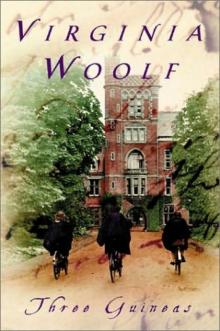 Three Guineas
Three Guineas Flush
Flush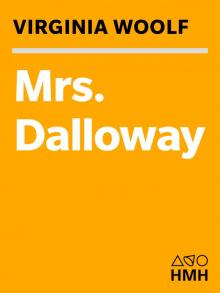 Mrs. Dalloway
Mrs. Dalloway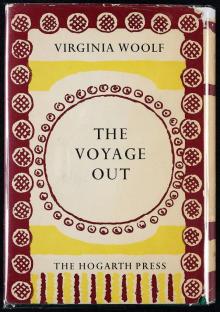 The Voyage Out
The Voyage Out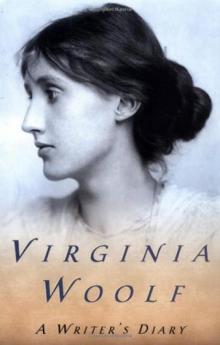 A Writer's Diary: Being Extracts From the Diary of Virginia Woolf
A Writer's Diary: Being Extracts From the Diary of Virginia Woolf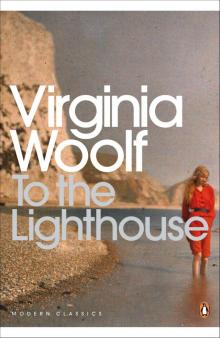 To The Lighthouse
To The Lighthouse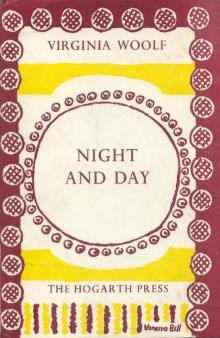 Night and Day
Night and Day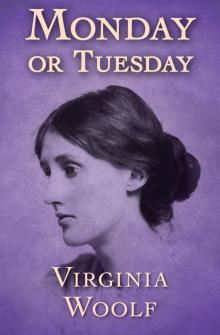 Monday or Tuesday
Monday or Tuesday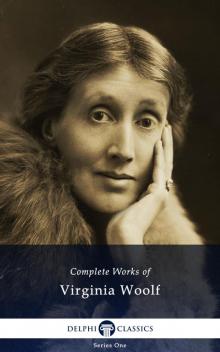 Complete Works of Virginia Woolf
Complete Works of Virginia Woolf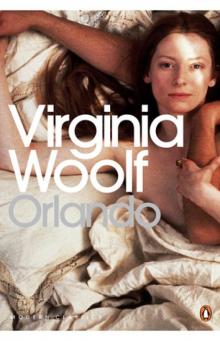 Orlando
Orlando Genius and Ink
Genius and Ink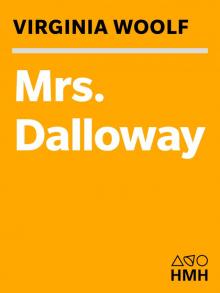 Mrs. Dalloway (Annotated)
Mrs. Dalloway (Annotated) Jacob's Room
Jacob's Room THE RUSSIAN POINT OF VIEW
THE RUSSIAN POINT OF VIEW A Writer's Diary
A Writer's Diary Woolf Short Stories
Woolf Short Stories